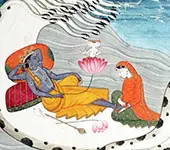Comments
Read more comments
Invoke the divine grace of Bala Krishna with this powerful mantra for peace, wisdom, and inner guidance.
गोपालाय विद्महे गोपीजनवल्लभाय धीमहि तन्नो बालकृष्णः प्रचोदयात्
I meditate upon Gopala, contemplate on Krishna, beloved of the Gopis, and seek the inspiration and guidance of Bala Krishna.
gopaalaaya vidmahe gopeejanavallabhaaya dheemahi tanno baalakri'shnah' prachodayaat
Listening to this mantra offers spiritual and mental benefits by invoking Lord Krishna's divine qualities. It helps calm the mind, fostering peace and inner tranquility. As a Gayatri mantra dedicated to Krishna, it enhances devotion and connection to the divine, especially focusing on his playful, loving aspects. The mantra encourages wisdom, guidance, and clarity, making it useful for those seeking spiritual growth and understanding. Additionally, it can evoke feelings of joy, purity, and innocence, as it recalls Krishna’s childlike form, Bala Krishna, promoting positivity and love in one's life.
Knowledge Bank
Legend of Tiruvanaikoil Jambukeswarar Temple, Tamil Nadu
The tale of Sage Jambu is integral to the origin story of the Jambukeswarar Temple in Thiruvanaikoil, one of the five sacred halls where Shiva is believed to have danced. According to legend, Shiva, during deep meditation on Mount Kailas, was mocked by Parvati. Angered by this, Shiva sent Parvati to Earth to worship him at a sacred place. Parvati found a forest of Jamun trees on the banks of the Kaveri River. Using her divine power, she created a linga from water for her worship. In this forest, Sage Jambu was performing penance. One day, he offered Shiva a ripe and delicious Jamun fruit. Shiva ate the fruit and spat out the seed, which the sage swallowed as a gift from the deity. To his astonishment, the seed began to grow into a tree inside him. Shiva then instructed Sage Jambu to live in the forest of Jamun trees and predicted that Parvati, in the form of Akilandeswari, would come to worship the linga there. Sage Jambu moved to Tiruvanaikoyil, where the Jamun seed sprouted from his head and grew into a large Jamun tree. Under this tree, Akilandeswari worshiped the linga, establishing the sacred site of the Jambukeswarar Temple.
What is the meaning of Devi?
दीव्यतीति देवी. The term Devi is derived from the Sanskrit root दिव् क्रीडा-विजिगीषा-द्युति-स्तुति-मोद-मद-स्वप्न-कान्ति-गतिषु. Someone with an aura around her, and who is brilliant is called Devi. The name also points towards her pleasant and dynamic nature, her victory over the evil and all her activities which she does in a playful mood.



